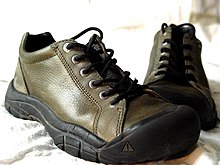кем
Jump to navigation
Jump to search
See also: Appendix:Variations of "kem"
Bashkir[edit]
Etymology[edit]
From Proto-Turkic *kem (“who”).
Cognate with Old Turkic 𐰚𐰢 (kim, “who”), Kazakh кім (kım), Kyrgyz ким (kim), Uzbek kim, Turkish kim, etc.
Pronunciation[edit]
Pronoun[edit]
кем • (kem)
- who
- Алдаҡсы булһаң, һиңә кем ышана?
- Aldaqsı bulhañ, hiñə kem ışana?
- If you are a liar, who will believe you?
- Кем белә, бәлки, башҡа сәбәбе лә барҙыр.
- Kem belə, bəlki, başqa səbəbe lə barźır.
- Who knows, maybe there is another reason as well.
- Мине кемгә hанайҙар икән, минең өсөн барыбер.
- Mine kemgə hanayźar ikən, mineñ ösön barıber.
- I don't care who they take me for.
Declension[edit]
Declension of кем (kem)
Derived terms[edit]
- һәр кем (hər kem, “everybody”)
Erzya[edit]

Etymology[edit]
From Proto-Mordvinic *kämə, from Proto-Uralic *kämä (“shoe”).
Pronunciation[edit]
Noun[edit]
кем • (kem)
- boot
- 1821, Novum Testamentum Mordvinice litt. cyrill.[1], page 22:
- А сумать ки ланксъ, а кавто одіожатъ, а кемть, а палкань, сексъ кона труди, се андови.
- A sumať ki lanks, a kavto odіožat, a kemť , a palkań, śeks kona truďi, śe andovi.
- No bag for the journey or extra shirt or sandals or a staff, for the worker is worth his keep.
- (literally, “[...] or boots [...]”)
Declension[edit]
This entry needs an inflection-table template.
References[edit]
- B. A. Serebrennikov, R. N. Buzakova, M. V. Mosin (1993) “кем”, in Эрзянь-рузонь валкс [Erzya-Russian dictionary], Moscow: Русский язык, →ISBN
- Keresztes, László (1986) Geschichte der mordwinischen Konsonantismus II. Etymologisches Belegmaterial[2], Szeged: Studia Uralo-Altaica 26.
Kazakh[edit]
| Alternative scripts | |
|---|---|
| Arabic | كەم |
| Cyrillic | кем |
| Latin | kem |
Etymology[edit]
Adjective[edit]
кем • (kem)
Russian[edit]
Alternative forms[edit]
- кѣмъ (kěm) — Pre-reform orthography (1918)
Pronunciation[edit]
Pronoun[edit]
кем • (kem)
- instrumental of кто (kto)
Shor[edit]
Etymology[edit]
From Proto-Turkic *kem (“who”).
Pronunciation[edit]
Pronoun[edit]
кем • (kem)
Southern Altai[edit]
Etymology[edit]
From Proto-Turkic *kem (“who”).
Pronoun[edit]
кем • (kem)
Categories:
- Bashkir terms inherited from Proto-Turkic
- Bashkir terms derived from Proto-Turkic
- Bashkir terms with IPA pronunciation
- Bashkir lemmas
- Bashkir pronouns
- Bashkir interrogative pronouns
- Bashkir terms with usage examples
- Erzya terms inherited from Proto-Mordvinic
- Erzya terms derived from Proto-Mordvinic
- Erzya terms inherited from Proto-Uralic
- Erzya terms derived from Proto-Uralic
- Erzya terms with IPA pronunciation
- Erzya lemmas
- Erzya nouns
- Erzya terms with quotations
- Kazakh terms borrowed from Persian
- Kazakh terms derived from Persian
- Kazakh lemmas
- Kazakh adjectives
- Russian 1-syllable words
- Russian terms with IPA pronunciation
- Russian non-lemma forms
- Russian pronoun forms
- Shor terms inherited from Proto-Turkic
- Shor terms derived from Proto-Turkic
- Shor terms with IPA pronunciation
- Shor lemmas
- Shor pronouns
- Southern Altai terms inherited from Proto-Turkic
- Southern Altai terms derived from Proto-Turkic
- Southern Altai lemmas
- Southern Altai pronouns